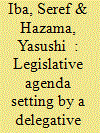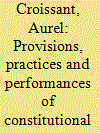| Srl | Item |
| 1 |
ID:
190812


|
|
|
|
|
| Summary/Abstract |
This article discusses the behavior of the Constitutional Court in Turkey. As the highest court in the country, it is responsible for many decisions that have shaped the course of Turkish politics over the past six decades. It begins with a brief overview of the institutional features of the Turkish Constitutional Court. It then looks at major arguments on constitutional review, including judicial independence and court-curbing. Finally, it examines change and continuity in the attitudes of the Court based on the speeches of its presidents. One conclusion is that the Constitutional Court has transformed itself from that of the defender of the state principles to that of the defender of human rights while retaining its role with regard to the separation of powers. This transformation has been driven by both internal and external pressures: the domestic transition of tutelary democracy to competitive authoritarianism and the equivocation of domestic laws with international treaties.
|
|
|
|
|
|
|
|
|
|
|
|
|
|
|
|
| 2 |
ID:
152453


|
|
|
|
|
| Summary/Abstract |
This article examines the political motives and legislative consequences of Turkish omnibus bills that propose to amend a large number of disparate, unrelated laws. The quantitative analysis reveals, first, that the government uses omnibus bills to covertly change existing laws by attaching new articles to bills that are being deliberated. Second, undercover legislation backfires. The larger the number of current laws changed by an omnibus bill, the more likely those changes are to be annulled by the Constitutional Court. The legislative-efficiency objective behind omnibus bills is thus undermined by legal errors and deficiencies that result from a lack of parliamentary discussion.
|
|
|
|
|
|
|
|
|
|
|
|
|
|
|
|
| 3 |
ID:
100303


|
|
|
|
|
| Publication |
2010.
|
| Summary/Abstract |
This analysis of the institutional design and actual performance of constitutional review in five newly democratized nations in East Asia shows that during the last two decades the judiciary has come to play an increasingly important political role in South Korea, Taiwan and Indonesia. Constitutional courts in these three countries are more active in counterbalancing executive and legislative power than ever before. This however contrasts with the experiences of Thailand and Mongolia where constitutional courts were unable to fulfill a similar function. The discussion for potential explanations for this cross-national variance in court performance supports the critique in parts of the scholarly literature against purely institutional, cultural and structural explanations. Rather, the degree of political uncertainty and diffusion of political power are critical determinants for understanding why politicians comply with court judgments, or attempt to marginalize justices. In addition, the relationship between institutional support, compliance and the area of judicial review matters. In this regard, one lesson of the East Asian comparison is that a too early introduction of review of separation of power conflicts could actually make things worse, by threatening the court's authority and marginalizing its influence. This represents a danger often neglected in the democratization literature that claims judicial control of horizontal accountability mechanisms would necessarily help to consolidate democracy.
|
|
|
|
|
|
|
|
|
|
|
|
|
|
|
|